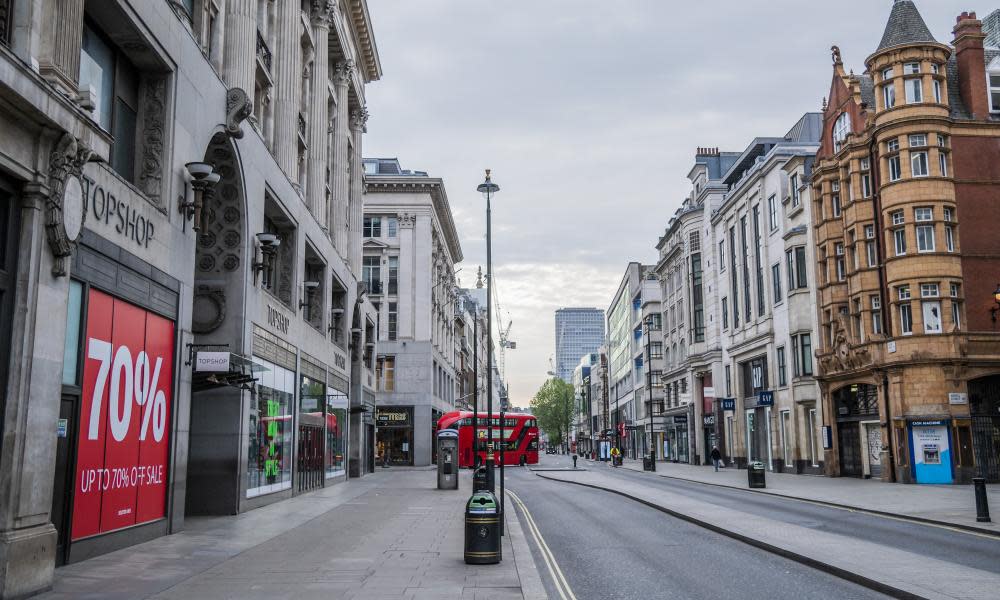UK economy likely to suffer worst Covid-19 damage, says OECD

Britain’s economy is likely to suffer the worst damage from the Covid-19 crisis of any country in the developed world, according to a report by the Organisation for Economic Cooperation and Development.
A slump in the UK’s national income of 11.5% during 2020 will outstrip the falls in France, Italy, Spain and Germany, the Paris-based thinktank said.
Germany’s decline in national income (GDP) will be 6.6% this year while Spain’s GDP will fall by 11.1%, Italy’s by 11.3 and France’s by 11.4%.
Highlighting the task awaiting the UK government as it seeks to ease the lockdown, the OECD ruled out a V-shaped recovery for the global economy, saying the path back to previous levels of activity would be hampered by long-lasting effects of the pandemic.
The forecast of an 11.5% drop in GDP this year is an improvement on the 14% fall in national income put forward last month as a likely “scenario” by the Bank of England, but will add to pressure on the government after the OECD found that even countries that have come under severe criticism for their handling of the pandemic will fare better than the UK.
Brazil, the US and Sweden were on course for contractions in GDP of 7.4% or less, the OECD said, while China was likely to drop by 2.6% and Russia by 8%.
Defining the global situation as “dire”, the OECD said increases in government debt and the level of outstanding loans of private firms and banks would accompany the downturn, which would average 6% across the world.
default
Laurence Boone, the OECD’s chief economist, played down the significance of the UK contracting by the biggest margin in its 2020 economic outlook. She said it was difficult to be precise in the current situation and the exercise showed the UK would experience a similar contraction to Spain, France and Italy, which also imposed severe lockdowns.
She warned that the world economy was “walking a tightrope” and could face a second outbreak of the virus, triggering another lockdown and a more severe recession.
The UK government has said that these five tests have to be met before they will consider easing coronavirus lockdown restrictions:
The NHS has sufficient capacity to provide critical care and specialist treatment right across the UK
A sustained and consistent fall in daily deaths from Coronavirus
Reliable data to show that the rate of infection is decreasing to manageable levels across the board
Operational challenges including testing and personal protective equipement (PPE) are in hand with supply able to meet future demand
Confident that any adjustments to the current measures will not risk a second peak of infections that overwhelms the NHS
Offering a forecast for both a single and double lockdown, Boone said the UK economy could contract by an unprecedented 14% if the government needed to impose a second lockdown this year.
She said: “These scenarios are by no means exhaustive, but they help frame the field of possibilities and sharpen policies to walk such uncharted grounds. Both scenarios are sobering, as economic activity does not and cannot return to normal under these circumstances.
“By the end of 2021, the loss of income exceeds that of any previous recession over the last 100 years outside wartime, with dire and long-lasting consequences for people, firms and governments,” she said.
Fearing an escalation of trade restrictions that would hamper the recovery, Boone said governments must prioritise cooperation, both in finding a vaccine and providing targeted support for hard-hit industries.
“Global cooperation to tackle the virus with a treatment and vaccine and a broader resumption of multilateral dialogue will be key for reducing doubt and unlock economic momentum,” she said.
“The international community should ensure that when a vaccine or treatment is available it can be distributed rapidly worldwide. Otherwise the threat will stay. Likewise, resuming a constructive dialogue on trade would lift business confidence and the appetite for investment.
“Governments must seize this opportunity to engineer a fairer and more sustainable economy, making competition and regulation smarter, modernising government taxes, spending, and social protection. Prosperity comes from dialogue and cooperation. This holds true at the national and global level.”

 Yahoo News
Yahoo News 
